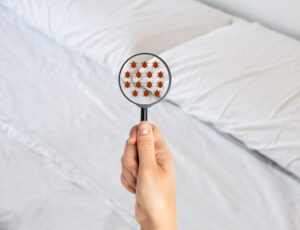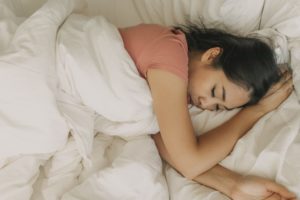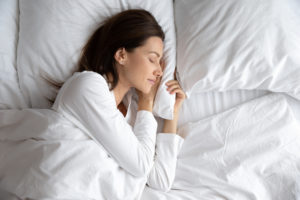Can You Die From Not Sleeping?
While a lack of sleep may not directly cause someone to die, the effects of sleep deprivation can build up over time and cause a variety of serious side effects that can impact health and daily life. Not getting enough sleep for a long time can lead to an increased risk of obesity, diabetes, stroke as well as dangerous workplace and traffic accidents.
Research indicates that 1 in 3 American adults do not get enough sleep. A person may sleep less than they need, sometimes for months or years, due to family, work, or social obligations. We discuss the negative effects of sleep deprivation, why it is important to get the recommended amount of sleep as well as tips for how to improve sleep.
Effects of Sleep Deprivation
Not getting enough sleep, also known as sleep deprivation, can affect your immune system, energy levels, thinking, libido, and mood. During sleep, the body carries out restorative work to support brain health and physical function which is why getting adequate sleep each night is so important.
Reduced Mental Clarity, Learning, and Memory
Some of the most noticeable effects of sleep loss are trouble focusing and difficulty staying alert. People who are sleep deprived may have difficulty with complex mental tasks, make more errors, and take more risks. Among children, lack of sleep may lead to trouble paying attention and poor academic performance.
The brain needs adequate sleep to clear out waste, process new information, form memories, and allow brain cells to rest. Sleep also helps create new mental pathways that pave the way for learning, problem-solving, creativity, attention, and decision-making.
Increased Accidents and Injuries
Sleep deprivation can increase the risk of serious car crashes, falls, and workplace accidents. After being awake for 24 hours, a person’s performance is similar to that of a person with a blood alcohol content of 0.10% , which is legally considered too drunk to drive in the U.S.
“Acute sleep deprivation leads to impaired judgment, worse than being drunk.”
Dr. Abhinav Singh, Sleep Physician
Impaired Immune System
Lack of sleep negatively affects the immune system, increasing inflammation and making people more likely to catch infections such as the common cold.
Metabolic Issues
Lack of sleep can decrease energy and activity levels as well as impact hormones that control appetite and blood sugar, which may lead to diabetes or obesity.
People who do not get enough sleep may have trouble regulating levels of two hormones that control appetite, ghrelin and leptin. When these hormones are not balanced, a person may experience cravings for fatty or sugary snacks and eat more food.
Sleep also affects the body’s ability to respond to insulin, which may raise blood sugar levels and cause diabetes.
Increased Cardiovascular Risk
During sleep, the heart and blood vessels generally do not work as hard as during waking hours, and this much-needed break is designed to protect them against long-term damage. Not sleeping enough is associated with high blood pressure, heart disease, and stroke.
Mental Health Symptoms
Sleep loss can result in a negative mood, irritability, or other unwanted psychological symptoms. People who consistently fail to get enough sleep may have a higher risk of developing mental health conditions such as depression. Lack of sleep is also associated with suicidality.
For children, sleep deprivation may lead to hyperactivity, acting out, mood swings, anger, or sadness.
Fatigue
Without enough sleep, a person may be too tired for everyday activities and may have trouble staying awake at work or school.
People who are sleep deprived may experience microsleep in which they fall asleep for a few seconds without meaning to. Microsleep can be especially dangerous if it happens while a person is driving a car, which may cause a serious car accident.

Chronic Sleep Deprivation Symptoms
Some people may feel that they have adjusted to a chronic lack of sleep. However, they will likely still experience the following effects of sleep deprivation:
- Daytime tiredness, especially during periods of low activity like sitting in traffic or meetings
- Trouble getting out of bed in the morning
- Difficulty concentrating, problem-solving, and making decisions
- Issues with memory and learning
- Slower reaction times
- Irritability
- Anxiety
- Trouble managing emotions
How Long Can You Go Without Sleep?
People can experience side effects of sleep deprivation even with seemingly minor sleep loss, such as sleeping one or two hours less than needed for a few nights. Those who experience poor-quality or interrupted sleep, such as people who have a sleep disorder, may show signs of sleep deprivation after just one night of bad sleep.
Many people are not aware of the effects of sleep deprivation and incorrectly believe that they can function well on less sleep. The majority of adults should sleep at least seven hours per night . People who are sick, have an active lifestyle, or are chronically short on sleep may need more sleep.
People with a rare disease called fatal insomnia experience a progressive inability to sleep, which lasts for months and eventually ends in death. Fatal insomnia also negatively affects brain cells, so it is not clear whether sleep loss is the direct cause of death.
Sleep Debt
The total number of hours a person is short on sleep is called their sleep debt. The more sleep debt someone has, the more they may feel the side effects of sleep deprivation. People may nap or sleep in to make up their sleep debt. However, naps are usually not enough to compensate for lost sleep and sleeping in can disrupt the body’s clock, making it harder to fall asleep at night.
Even if there are multiple attempts to make up accumulated sleep debt, the body still may have a hard time recovering. The best way to ensure you are getting the rest you need is to get the recommended amount of sleep on as many nights as possible. If you know in advance that you need to skip a night of sleep, it may help to sleep a few more hours the night before.
How to Improve Your Sleep
In addition to getting enough sleep, it is also important to get high-quality sleep. Better sleep starts with sleep hygiene, a collection of habits that help your body prepare for rest.
- Schedule enough time for sleep: Prioritize getting at least seven hours of sleep per night.
- Maintain a sleep schedule: Go to bed and wake up at the same time every day, regardless of whether it is a weeknight or a weekend.
- Optimize your sleep environment: Limit screen time in the evening and keep your bedroom cool, dark, and quiet.
- Create a bedtime routine: A consistent bedtime routine with soothing activities, such as taking a bath, can help you wind down for sleep.
- Avoid spending time in bed while awake: Use your bed only for sleep and sex. If you are having trouble falling asleep, get out of bed and leave your bedroom until you feel sleepy again.
- Go outside: Try to spend time outdoors in the sun during the day.
- Avoid napping in the afternoon and evening: Do not schedule naps too close to bedtime as this can make it difficult to fall asleep at night.
- Watch what you consume before bedtime: If you drink too many liquids before bed, you may wake up at night to use the bathroom. Also avoid nicotine, caffeine, and alcohol which can disrupt sleep.
If you have recently stayed up all night or if your work schedule overlaps with normal sleeping hours, you may need to make up for the lost sleep. When napping during the day, use blackout curtains and earplugs to block out light and sound. If you are a shift worker, seek out bright light and caffeine at the beginning of your shift and avoid light before bed.
When to Talk to Your Doctor
Speak to your doctor if you regularly have trouble sleeping or if you often feel tired during the day. Your doctor can test to see if you have an underlying sleep disorder such as insomnia which may be interfering with your sleep and help you establish a treatment plan.

Still have questions? Ask our community!
Join our Sleep Care Community — a trusted hub of sleep health professionals, product specialists, and people just like you. Whether you need expert sleep advice for your insomnia or you’re searching for the perfect mattress, we’ve got you covered. Get personalized guidance from the experts who know sleep best.
References
5 Sources
-
Cirelli, C. (2022, October 10). Insufficient sleep: Definition, epidemiology, and adverse outcomes. In R. Benca (Ed.). UpToDate., Retrieved April 16, 2023, from
https://www.uptodate.com/contents/insufficient-sleep-definition-epidemiology-and-adverse-outcomes -
National Institute for Occupational Safety and Health. (2016, July 15). Risks from not getting enough sleep: Impaired performance. Centers for Disease Control and Prevention., Retrieved April 16, 2023, from
https://www.cdc.gov/niosh/emres/longhourstraining/impaired.html -
National Heart, Lung, and Blood Institute. (2022, June 15). How sleep affects your health., Retrieved April 16, 2023, from
https://www.nhlbi.nih.gov/health/sleep-deprivation -
Consensus Conference Panel, Watson, N. F., Badr, M. S., Belenky, G., Bliwise, D. L., Buxton, O. M., Buysse, D., Dinges, D. F., Gangwisch, J., Grandner, M. A., Kushida, C., Malhotra, R. K., Martin, J. L., Patel, S. R., Quan, S. F., Tasali, E., Non-Participating Observers, Twery, M., Croft, J. B., Maher, E., … Heald, J. L. (2015). Recommended amount of sleep for a healthy adult: A joint consensus statement of the American Academy of Sleep Medicine and Sleep Research Society. Journal of Clinical Sleep Medicine, 11(6), 591–592.
https://pubmed.ncbi.nlm.nih.gov/25979105/ -
Vitale, K. C., Owens, R., Hopkins, S. R., & Malhotra, A. (2019). Sleep hygiene for optimizing recovery in athletes: Review and recommendations. International Journal of Sports Medicine, 40(8), 535–543.
https://pubmed.ncbi.nlm.nih.gov/31288293/










